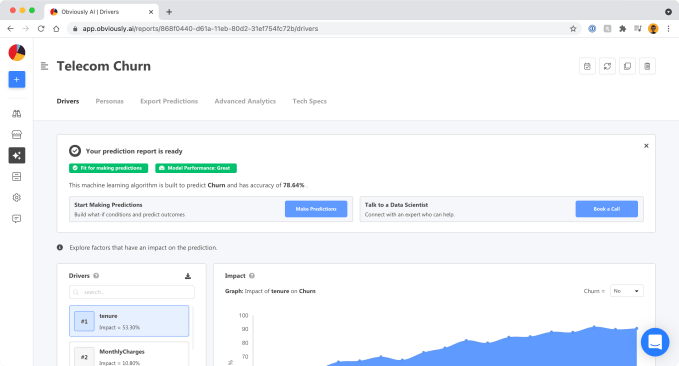Nirman Dave’s two startups are very different, but both have a DIY spirit. The first, called CircuiTricks and founded during his gap year after high school, created kits to teach students about electronics and physics. Now Dave is chief executive officer of Obviously AI, a no code AI/ML platform that enables people without technical backgrounds to build and train machine learning models. The Berkeley-based company has raised a seed extension that brings the round’s total to $4.7 million, up from the $3.6 million it announced two months ago. The extension was led by the University of Tokyo Edge Capital Partners (UTEC), a deep tech investment firm, with participation from Trail Mix Ventures and B-Capital.
UTEC principal Kiran Mysore told ProWellTech that he found Obviously AI on Product Hunt while helping a friend without an AI/ML or coding background build machine learning models. After using Obviously AI and benchmarking it against other AutoML products, Mysore was so impressed that he reached out to the startup and led the investment round.
No code/low code startups have gained a lot of attention—and funding—over the past year. Some notable examples are Noogata and Abacus. Dave says Obviously AI’s niche is mid-market businesses that don’t have a data science team, or have people who know data analytics but are not programmers.
Obviously AI uses proprietary technology called “Edge-Sharp AutoML” to build and train machine learning models that are customized to their clients’ needs, and can be integrated into their existing cloud services and databases. It focuses on marketing, software, direct-to-consumer, fintech and insurance companies, and currently has more than 3,000 clients, who have used more than 82,000 predictive models hosted on Obviously AI’s model.
Its new seed funding will be used to expand in Asian markets including Japan, where it will partner with client Dai Nippon Printing (DNP), one of the country’s largest printing companies, on its go-to-market strategy.
In an email to ProWellTech, Takeya Shimomura, research and development manager at Dai Nippon Printing, said, “At DNP, cutting edge predictive analytics for marketing and sales is very important to us. However, the tools today are very complicated and take months to get results. With Obviously AI, we were able to onboard several of our analysts seamlessly and got up and running in just a few hours.”
Dave met Obviously AI’s co-founder and chief technology officer Tapojit Debnath while both were international students at Hampshire College. After graduating, they started internships at startups in the Bay Area. Dave was a data science intern at Streamlabs, the live-streaming software platform.
Originally hired to work on video encoding algorithms, Dave also spent a lot of time building machine learning models for the company’s marketing and sales team. Debnath, who was a machine learning intern at retail software startup B8ta, had a similar experience.
The two realized there is a talent shortage of machine learning engineers, and many companies rely on “citizen data analysts,” or people who understand data science, but don’t have coding experience.
“These are people that work with a lot of data but they’re not programmers themselves, and these are the kind of folks we designed these tools for. The goal is that you understand the data, and you can take that data and use the software to build a model really fast, without waiting for hours or days,” said Dave.
He and Debnath quit their jobs in 2018 to start working on the startup, doing chores for their Airbnb host in exchange for rent while learning how to pitch to investors, before joining U.C. Berkeley’s SkyDeck accelerator program.
Dave said that many auto AI/ML software platforms “brute forces a bunch of different algorithms on a data set, and picks one that performs the best.” For example, they might run 100 different algorithms before picking the one that performs the best, which means the time spent automatically building the other algorithms is wasted.
What Obviously AI’s Edge-Sharp AutoML does differently is look at a specific group of machine learning models that can be used on a data set before automatically shortlisting the top five models for a client’s needs, automatically tuning their hyperparameters and returning prediction results.
Obviously AI’s pricing plans start at $75 a month. Its typical clients are mid-sized businesses or small teams in larger businesses that don’t have a data science team, or whose data scientists are preoccupied with other work.
For example, a small microlending company in India with a team of about 15 people was manually deciding which applicants to give loans to when they decided to switch to AI models. They started using Obviously AI to automatically predict the chances of an applicant defaulting and how much they should be loaned. Now the company uses Obviously AI end-to-end in their app, which means customers can see the size of a loan they are likely to get immediately after applying.
Another use case is a German mobile gaming company that wanted to use a dynamic pricing model and needed to figure out how much individual users would be willing to pay for products like in-game tokens. They use Obviously AI to make that prediction based on a player’s interaction with a game.
Part of Obviously AI’s seed funding will be used on machine learning research and development to serve more use cases. Dave said that Obviously AI focuses on supervised learning use cases, where clients have data and know what to predict. Unsupervised use cases are where they have a data set, but don’t know exactly what they want, and use machine learning models to tell them if there are any interesting patterns in it. Unsupervised learning algorithms can be used for things like automatic categorization or recommendation engines on e-commerce platforms.




